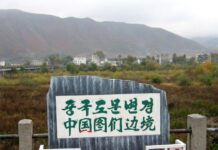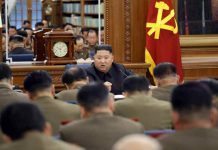The North Korean government is actively helping trading organizations import the raw materials needed for its “20×10 regional development policy,” Daily NK has learned. The government’s efforts are raising hopes that the door will soon open for expanded trade.
“[The government] is stressing the import of raw materials to promote its regional development policy. It’s seeking to give primary access to trading organizations that are capable of executing the state’s designated trade plan,” a source in North Pyongan Province told Daily NK on Wednesday, speaking on condition of anonymity.
North Korean leader Kim Jong Un used a policy address before the 10th session of the 14th Supreme People’s Assembly on Jan. 15 to unveil his 20×10 regional development policy, which seeks to build modern industrial facilities in 20 counties each year to raise the standard of North Koreans’ material culture over the next ten years. Since then, Kim has been underlining the need to proactively implement that policy.
In response, the North Korean authorities are seeking to ensure that trading organizations that are capable of importing the raw materials needed for that policy are equipped to do as much work as possible, pending authorization from the state, the source explained.
“[The government] is planning to issue more trade permits for importing raw materials. At the moment, brute force or personal connections aren’t enough [to get a permit issued], and the review process is challenging because officials want assurance about guaranteed results. But more organizations are taking the bull by the horns in the belief that trade is the only way to survive,” the source said.
In fact, some trading organizations are hopeful that trade will be revitalized because of the increasing need to import materials to implement the 20×10 regional development policy, the source said.
“All trade was brought under the control of the central government after the pandemic. While the trade permit issuance process is tricky, there’s a definite plan to issue more permits. That’s leading more traders to regard this as a policy that will give them more breathing room,” the source said.
North Korea completely halted trade when it closed its borders following the spread of COVID-19 in 2020. At the same time, it used COVID-19 as a pretext for reviving total state supervision of trade, which greatly increased government control of trading activities. Even while the pandemic’s impact was easing, North Korea has resumed trade very cautiously under tight restrictions.
“If only the government would stop throwing up roadblocks, I think trade would soon rebound, at least in North Pyongan Province. I think the state needs to delegate some of its authority so that trade can effectively save the cities, which will in turn save the provincial economy,” the source said.
Meanwhile, North Korea’s trading organizations are raising the funds needed for importing raw materials from donjuLiterally "masters of money," donju refers to people who hav... More and other individuals.
“The various organizations are relying on a strategy of raising funds on their own. Organizations that are regarded as credible enough are borrowing money from the donjuLiterally "masters of money," donju refers to people who hav... More under the guise of patriotism,” the source said.
Translated by David Carruth. Edited by Robert Lauler.
Daily NK works with a network of sources living in North Korea, China, and elsewhere. Their identities remain anonymous for security reasons. For more information about Daily NK’s network of reporting partners and information-gathering activities, please visit our FAQ page here.
Please send any comments or questions about this article to dailynkenglish@uni-media.net.



















